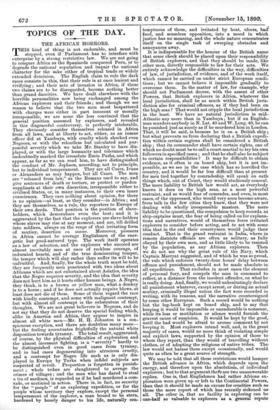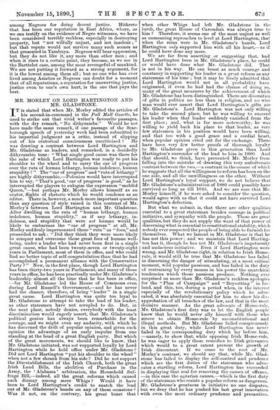TOPICS OF THE DAY.
THE AFRICAN HORRORS. THIS kind of thing is not endurable, and must be stopped, even if Parliament has to interfere with enterprise by a strong restrictive law. We are not going to conquer Africa as the Spaniards conquered Peru, or to • degrade the national reputation and impair the national character for the sake either of tropical trade or widely extended dominion. The English claim to rule the dark races consists in this, that their rule is at once lenient and vivifying ; and their acts of invasion in Africa, if these two claims are to be disregarded, become nothing better than grand dacoities. We have dealt elsewhere with the horrible personalities now being exchanged among the African explorers and their friends ; and though we see reason to believe that the two men most bespattered with charges were either in part innocent or morally irresponsible, we are none the less convinced that the general position assumed by explorers, and revealed in this disgraceful controversy, is perfectly intolerable. They obviously consider themselves released in Africa from all laws, and at liberty to act, either, as an insane officer did at Yambuya, with cruelty which shocked even Negroes, or with the relentless but calculated and pur- poseful severity which we take Mr. Stanley to have dis- played, or with the large humanity and tolerance which undoubtedly marked the irresolute Emin Pasha, and which appear, as far as we can read him, to have distinguished- the conduct of Mr. Jephson, according, not to principle, but to individual temperament. They are all Czars, Ivan or Alexanders as may happen, but all Czars. The men are " released from law," as the Romans used to say, and give sentences of death or torture, or protect or pardon suppliants at their own discretion, irresponsible either to civilised States, or, in many instances, to their own inner consciences. They care nothing about opinion, for there is no opinion—at least, so they consider—in Africa ; and they are themselves, as a rule, the reporters to Europe of their own deeds. That position is the position of slave- holders, which demoralises even the best ; and it is aggravated by the fact that the explorers are slave-holders whose slaves may rise at any moment, and are, till drilled into soldiers, always on the verge of that irritating form of mutiny, desertion en Inane. Moreover, pioneers in Africa cannot be average Englishmen of the ener- getic but good-natured type. The work itself operates as a law of selection, and the explorers who succeed are almost inevitably men at once of reckless courage, of indurated hearts, and of the true domineering temper, the temper which will slay rather than suffer its will to be unfruitful. And, finally, for the whole truth must be told, they are frequently men penetrated with two ideas about Africans which are not entertained about Asiatics, the idea that the Negro requires severity, and the idea that severity does not hurt him as it hurts other human beings. A Negro, they think, is to a brown or yellow man, what a donkey is to a horse ; and if he does not actually require blows, at least does not die of them. Some of them regard the race with kindly contempt, and some with malignant contempt, but with almost all contempt is the substratum of their thoughts. We are not great believers in Negroes, and do not say that they do not deserve the special feeling which, alike in America and Africa, they appear to inspire in almost all white men—Mr. H. H. Johnston is a con- spicuous exception, and there are doubtless many more— but the feeling accentuates frightfully the natural white disposition towards tyranny. The total result, aggravated, of course, by the physical difficulties of exploration and the almost incessant fighting, is a " severity" hardly to be distinguished even in good cases from tyranny, and in bad cases degenerating into atrocious cruelty, and a contempt for Negro life such as is only dis- played in Europe by Turks when infidel subjects are suspected of revolt. Proportion is forgotten in punish- ment ; whole tribes are slaughtered to avenge the crimes of villages ; and the man who has dared to steal a tin of sardines, is regarded as if he had murdered a com- rade, or mutinied in action. There is, in fact, no security for the " people" of an exploring expedition, or for the people whose territory they explore, except the personal temperament of the explorer, a man bound to be stern, hardened by hourly danger to his life, naturally con- temptuous of them, and irritated by heat, ulcers, bad food, and senseless opposition, into a mood in which justice has no meaning, and the whole nature concentrate* itself on the single task of sweeping obstacles and annoyances away.
It is indispensable for the honour of the British name that some check should be placed upon their responsibility of British explorers, and that they should be made, like other men, directly responsible to law for their acts. We _entirely acknowledge the difficulties in the way, difficulties of law, of jurisdiction, of evidence, and of the work itself, which cannot be carried on under strict European condi- tions ; but we cannot believe it impossible gradually to overcome them. In the matter of law, for example, why should not Parliament decree, with the assent of other Powers, that British explorers in Africa, whatever the local jurisdiction, shall be as much within British juris- diction also for criminal offences, as if they had been on the high seas ? That would not cripple the local jurisdiction, in the least. We have no natural jurisdiction in mid.- Atlantic any more than in Yambuya ; but if an English- man murders anybody in N. Lat. 40 and W. Long. 40, he can be punished just as surely as if he murdered him in London.. That, it will be said, is because he is on a British ship ; but what prevents us from declaring that a British expedi- tion within certain regions shall be considered a British ship ; that its commander shall have certain rights, one of which no doubt must be to call a court-martial to try his own followers in specified cases ; and that he shall also be subject to certain responsibilities ? It may be difficult to obtain• evidence, as it often is on board ship, but it is not im- possible, as we see in the case which has so horrified the country, and it would be far less difficult than at present for men tied together by comradeship will speak on oath things which, out of Court, they would studiously conceal. The mere liability to British law would act, as everybody knows it does on the high seas, as a most powerful restraint, and so would fear of comrades, and even, in most cases, of the oppressed, who would very soon become aware, from talk in the few cities they know, that they were not dealing with wholly irresponsible masters. The mere liability to be questioned, the compulsion to keep records, as ship-captains must, the fear of being called on for explana- tions and narratives, would of themselves force irritated explorers to consider before acting, and to act with some idea that in the end their countrymen would judge their conduct. That is the grand restraint in India, where in remote districts officials are often as solitary, as fully obeyed by their own men, and as little likely to be resisted by the population, as any African explorers. Then we do not see why the great rule of the Navy, which Captain Marryat suggested, and of which he was so proud, the rule which enforces twenty-four hours' delay between offence and punishment, should not be made absolute in all expeditions. That excludes in most cases the element of personal fury, and compels the man in command to reflect, at a distance from the insolent offender, on what he is really doing. And, finally, we would unhesitatingly declare all punishment whatever, except arrest, or during an actual mutiny, criminally illegal unless the fact were recorded in writing, with its reasons, and the narrative countersigned by some other European. Such a record would be nothing but the log-book kept on board ship, and to say that keeping it would be impossible or unendurable is nonsense, while its loss or mutilation or silence would furnish the gravest cause of suspicion. It would be kept by the good, until the bad would be afraid to arouse comment by not keeping it. Most explorers intend well, and, in the great majority of cases, would no more think of violating simple and explicit laws, supported by the opinion of those to whom they report, than they would of travelling without clothes, or of adopting the religions of native tribes. The law would not harass them except occasionally, and would quite as often be a great source of strength.
We may be told that all these restrictions would hamper the British advance in Africa, which depends upon the energy, and therefore upon the absolutism, of individual explorers ; but to that argument thefe are two unanswerable replies. One is, that Englishmen had rather African ex- ploration were given up or left to the Continental Powers, than that it should be made an excuse for cruelties such as those the mere report of which has recently sickened us- all. The other is, that no facility in exploring can be one-half so valuable to explorers as a general repute among Negroes for doing decent justice. Hitherto that has been our reputation in East Africa, where, as we can testify on the evidence of Negro witnesses, we have been considered terribly reckless, especially in destroying property, but " not wilfully unjust, and not insolent ; " but that repute would not survive many such scenes as that presented in Yambuya. Negroes will bear oppression, but they do not like it, any more than other men ; and when it rises to a certain point, they become, as we see in the Barttelot case, among the most revengeful of mankind. We are not putting it forward as a strong argument, for it is the lowest among them all ; but no one who has ever lived among Asiatics or Negroes can doubt for a moment that of all reputations, a reputation for unswerving justice, justice even to one's own hurt, is the one that pays the best.



















































 Previous page
Previous page